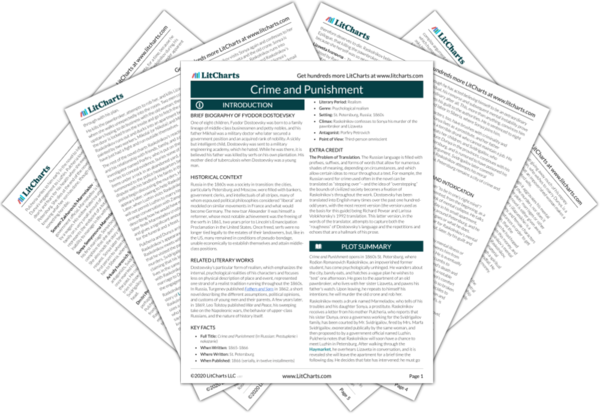Summary
Analysis
Raskolnikov visits Sonya, who has been waiting for him all day. She worries that a fear of death is all that is keeping him alive. He announces that he has come to her for his cross, which she promised him the last time they met.
The cross represents Raskolnikov’s desire to confess. Although he is still not convinced of the moral necessity of confession, he understands that he can no longer avoid the authorities.
Themes
He states his desire to go and confess to the police alone, though Sonya wants to accompany him. He wonders still if there isn’t some way to avoid having to admit to his crime. Sonya asks that he bow down and confess to the murders in a public place. He leaves Sonya, walks through the Haymarket, and gives a five kopeck piece to an old woman. He falls down in the street, bowing and standing up again, but he is not able to say aloud that he has killed.
Sonya tells him to fall down in public and confess his sins out loud. Raskolnikov is able to bow down but unable to verbally confess, and the people milling about that area believe he is another drunk from the Haymarket, stumbling about and babbling about nothing. Thus the Haymarket returns as a symbol of moral degradation, even as Raskolnikov attempts to “come clean” about his guilt.
Themes
The people around him believe he is merely drunk. Raskolnikov walks to the police station and realizes he wishes to confess to Gunpowder, the loud lieutenant and assistant to Nikodim. Raskolnikov enters and sees Gunpowder but cannot confess; he stammers and says, instead, that he has come to talk to Zamyotov, who is out. He has a brief, trifling conversation with Gunpowder. As they speak, Raskolnikov overhears someone else talking about how Svidrigailov has killed himself.
At the last moment, Raskolnikov is unable to articulate his guilt to Gunpowder, the loud lieutenant from earlier in the novel. He finds out, coincidentally, that Svidrigailov has committed suicide. This means he no longer needs to shield Dunya from Svidrigailov, and that there is no longer any hard evidence of his crime. There is merely psychological evidence, which gives him a chance to beat the rap and escape punishment, as he has tried to do throughout the novel.
Themes
He walks outside, not having the courage to confess and rattled by Svidrigailov’s death. In the courtyard he finds Sonya, who wordlessly urges him back into the station to admit to his crime. He turns and reenters the building. He walks up to Gunpowder, who is confused about his return, and announces simply: “It was I who killed the official’s widow and her sister Lizaveta with an axe and robbed them.”
When he walks outside, however, he sees Sonya. And seeing her gives him the strength to confess to his crime despite the fact that he could potentially avoid having to do so, could escape any punishment at all. This is an important point: because of Sonya, Raskolnikov confesses willingly, not under threat or coercion from Svidrigailov. He faces his crimes. His confession is simple and leaves no room for the ambiguities that have come to dominate the novel. He acknowledges that he robbed and killed; his punishment can now begin.
Themes
Get the entire Crime and Punishment LitChart as a printable PDF.













